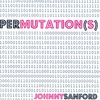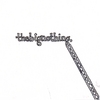The Tao of the Dude "If I was just gonna say one thing to y'all tonight,
I'd say “set the artist free.”
I'm talking about the artist in here, set it free.
I'm saying “Quit your day job.”
--Tenacious D
The Starving Artist
Word of advice--Don't quit your day job. When it comes to doing what you love to do, remember that you also have to put some food on the table. But never, ever give up on your dream. I won't pretend to the end-all, be-all expert in the field of art. I can't cite dates or name obscure names in the realms of early jazz musicians, and I haven't read too much regarding post-modern theory in literature. What I do know, however, is that art is the soul's search for some type of tangible truth. The greatest gift we have been given is the ability to percieve and understand the present moment. Flawless and abstract, we humans glide through time and space essentially free from the past and future like any other mammal, connecting each past and future moment with present being. Early in the development of the human mind, we realized the potential beauty and truth in creation. Creating something from nothing for the sake of others enjoyment was an attempt at breaching the into the divine and understanding perfection. Men were given the female form and vice versa to wonder over, and thus for eons we have taken blood to wall, stick to sand, fist to clay, brush to canvas, pen to paper and fingers to string, playing out our parts in a cosmic symphony. Human beings did not fall from the Kingdom of Heaven. We are in the midst of building it for ourselves. It is in this search for beauty, this artistic endevor in which the artist takes, in which we realize our own collective Godhood.
When I came to New York City last year, I moved here on a wing and a prayer. I didn't have any friends, had only about two-thousand dollars in my bank account, and was vastly inexperienced when it came to the city-life. As an aspiring musician, I had dreams of playing around town a couple of times only to find some record executive in the audience one night handing me a record contract the next morning over breakfast. What I found, however, was that everyone and their grandmother living in New York City has that same dream.
Suddenly it wasn't about the collective joy of creating art, but rather an endless Darwinian competition as to who was “better” at their craft. After only four gigs, I became disenchanted with the whole system and stopped playing gigs. The root of the problem was the loss of faith in myself. To see other artists who have honed their craft for years and years is not something to sneeze at, no matter how high the horse is that you come in on. Remember that someone will always be more skilled than you, but they can never be you. Your music or art, or whatever it is you do, is yours and can never be taken away, so it is entirely unique and beautiful. Sometimes, however, you need practice. You wouldn't take a dull sword into battle, would you?
Following shortly after this abrupt “end” to my music career, my creativity also shriveled up and receded somewhere deep into my subconscious. Struggling financially, I prodded and pleaded with my unconscious mind to tell me what I was good at. Not just good, but what was I great at?
What I realized was that over the course of over six months of living paycheck to paycheck was that I already was an expert artist, in an unconventional sense. I was an expert in the art of surviving as a starving artist. I had honed my skills of urban survival in the fires of the “real world,” living on only two-hundred dollars a week, a sum most normal people might cringe at. I have been successful in finding loopholes in the structures of society so that I can live comfortably, without stealing a dime. I also found full medical and dental health care for a little over fifteen dollars a week with paid time-off. My schedule was flexible so that I could take time off for any creative venture I wanted because I was only part-time. My rent is still ridiculously cheap, and I live only a subway ride away from the artistic capital of the world.
So, instead of giving up, my creativity switched to a most Buddhist notion to that of living daily life. I began writing down the solutions I had come up and this book was born. More than a few times I felt like throwing in the towel and giving into the temptations of a better salary, essentially forsaking my dreams of artistic success for a paycheck. But something inside me told I couldn't quit. Perhaps that same, strange voice from deep within is telling you the same thing. Perhaps you too cannot force yourself into the same mundane lifestyles of the middle-class and bored.
For those of you that are in search of something within, hopefully this collection of tips and tricks to survive in as a starving artist in the real world will prove helpful, because the world needs more artists. This book is essentially a collection of tips and tricks I’ve learned in order to live a life of comfort while dedicating the least amount of time and cash possible to the necessities like paying for rent, food, and everything else. I will give you the know-how, and explain some of the common mistakes that a burgeoning artist might make when coming to New York City. Once you get on that train, plane, or automobile, you are on your own. Please allow me to be your guide to such an enchanting city.
I’ve had to make some sacrifices here and there, but I am still able to do everything I used to be able to do, like getting drinks at a bar, as well as having a reliable means of transportation, the ability to go shopping when I want to, and so forth. So if you just graduated from a Liberal Arts school with a piece of paper you just don’t know what to do with yet, and want to give being an artist a shot before going down that other path that starts on the bottom of a corporate ladder, then you’ve found the right book. I actually started this book because I felt that if I had been given these tips, some obvious, some not-so-obvious, that I would be even better off today. Best of luck to you in all of your artistic endeavors, whatever they are. Remember that without you and people like you, there would be no such thing as art.
A word of warning—this book is not for people looking for long-term fulfillment in the wage-slave industries that this book takes advantage of in order to further hone your artistic craft. That is because there isn't long-term fulfillment to any wage slave industry—they will slowly drive you insane. However, no good writer, musician or artist that I know of has ever made meaningful art without surviving through struggle. Just as a rose grows out of a pile of manure, so does the artist out of struggle. This book is not for armchair artists. Having a strong work ethic is fundamental to being a successful artist. I believe that the myth of being a lazy, unemployed artist should be dispelled this instant. There is not a single successful artist that just happened to be discovered while sitting in their living room eating cheese doodles and watching reruns of Seinfeld. Even the winners of American Idol had to stand in line for a day or two. Getting out of the parent's basement and setting up an actual plan for moving to New York City is the first step to realizing one's dreams of success in the entertainment business. One must actively be pursuing their work, not giving it lip service by telling everyone how great an artist you are and then turning on the boob tube for hours. Practice your art. You can’t be a concert pianist if you’re practicing the skin-flute all day.
With that said, it might seem impossible at first to succeed as a working artist. This brings up another type of person that this book is not for—the unbeliever. If you don't believe in yourself, then how can you believe in your art? This book can only show you how you get to the door, but it can’t tell you which door or what kind of key you need to open it. It might take years for one idea to succeed, but as long as the idea remains relevant, it is never a failure, it is merely in limbo. Constantly look for other artists to critique and give constructive criticism to your ideas. The slab of marble, Michelangelo said, was always the statue of David, he just cut away the excess. Have your friends help you do the same to your masterpiece.
Another helpful tip is to always have multiple projects to work on in case you find yourself the only person interested in your idea. If you are actively pursuing your dream, success will find you. Perhaps not commercial successes at first, but so long as you believe wholeheartedly that you are saying what you believe is truth, you should feel the success in waves. Th first wave will barely be a ripple; a compliment, a “keep doing what you’re doing,” and then bigger and bigger, and finally as a tsunami in which you are playing a sold out show at Madison Square Garden, auctioning your art for a cool quarter-million, or getting interviewed by Leno in promotion for your next film. If you believe it, you can be it. If you don’t think it can be done, ask Eddie Vedder and that little garage band called Pearl Jam.
I know what you’re thinking. “This writer has such a bloated ego! He’s comparing himself to Eddie Vedder!” In truth, I’m not. What I do believe is that if Eddie Vedder was still a starving artist, there would be something deeply wrong with the music industry. In the end, his voice was one of truth that couldn’t be stopped by any corporate stranglehold on the music industry. He also believed in himself and kept honing his ability until it paid off in a big way. If you believe you have that same voice, who am I to say that you don’t? This book is about people who believe in their heart of hearts that they have something inscrutable and unique that needs to be sung from the mountain tops. So I say, compare yourself to the greats. Even if it doesn't work out, you can always look back with some level of gratification to the fact that at least you tried your best. You will have a much more interesting and fulfilling life if you have the life of an artist instead of a corporate shill who goes to bed with the ghost images of his accounting spreadsheets dancing in his head. My advice is to follow your heart, not your wallet.
My next blog will be dedicated to creative blocks and how to get rid of them....










